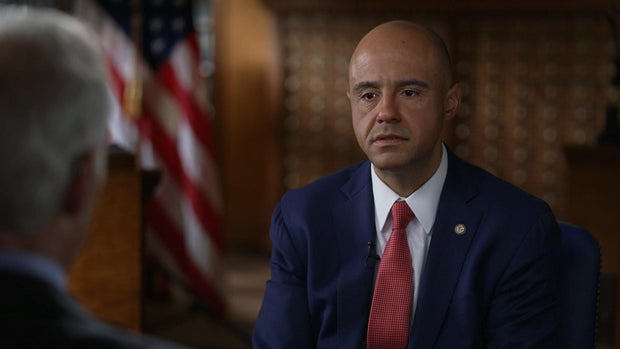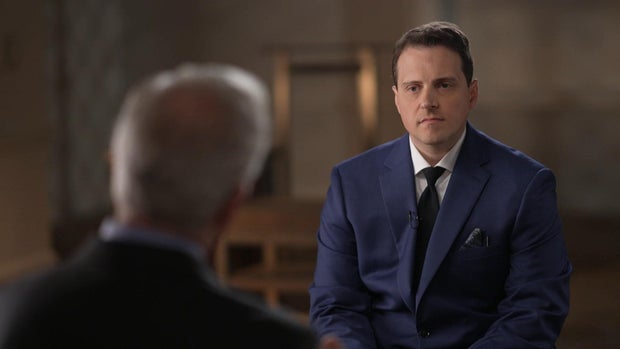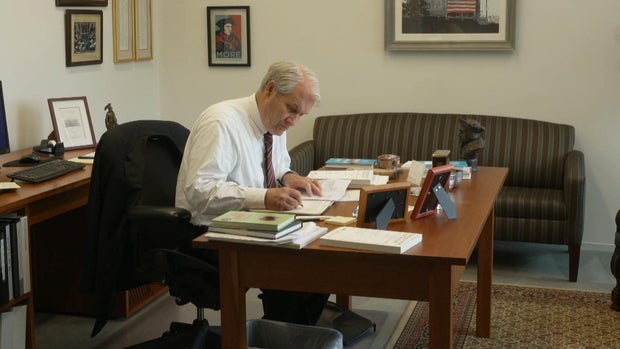CBS News
U.S. Attorney Matthew Graves says that Jan. 6 has “probably the most recorded crimes in all of our history”

As the 2024 election nears, Matthew Graves, U.S. attorney for the District of Columbia, remains focused on cases tied to the last time former President Donald Trump was on the ballot.
The Jan. 6, 2021, attack on the Capitol that disrupted the counting of the electoral votes triggered the largest prosecution in U.S. history. Trump has called the rioters “hostages” who’ve been treated unfairly and has said he’s “inclined to pardon many of them.” Top prosecutor Matthew Graves said the process has been “the picture of due process.”
“No one is being prosecuted for their views. They’re being prosecuted for their acts,” Graves said.
January 6 convictions
More than 1,000 Americans have been convicted in connection with the Jan. 6, 2021 attack on the Capitol, with about 350 trials still pending and the FBI still searching for suspects. Just two people have been acquitted of all charges.
Graves explained the process of prosecuting the Jan. 6 rioters began the very next day under the Trump Justice Department. It set the standards for the prosecutions. Decisions were made by “career” prosecutors, who work at Justice for years regardless of who the president might be.
60 Minutes
“The career prosecutors quickly realized that you needed guidelines in place, determinations about who was gonna be charged, who wasn’t gonna be charged, and what they would be charged with,” Graves said. “That process started in January 7th, 2021, during the prior administration. To this day, we continue to use guidelines that the career prosecutors put in place during the prior administration.”
Those guidelines have prosecutors focusing on people who entered the Capitol, people who engaged in violent or destructive behavior, people who illegally carried firearms or other weapons on Capitol grounds and people who helped others to get into the Capitol building, Graves said. The Justice Department is not charging everyone who was there that day.
“We have turned down hundreds of cases where the FBI is saying, ‘There is evidence here, it’s your determination, prosecutors, whether you think this should be prosecuted,'” Graves said.
Graves explained that some of the cases have been turned down because they don’t fit within the guidelines career prosecutors have been using. In some cases, prosecutors don’t feel there’s sufficient evidence to prove guilt beyond a reasonable doubt.
The best evidence prosecutors have
Thousands of hours of video and thousands of photos show the events unfolding.
“The crimes that occurred that day are probably the most recorded crimes in all of our history,” Graves said.
Video from that day captured the attack on Metropolitan Police Officer Daniel Hodges, who spoke with 60 Minutes in his “personal capacity and not on behalf of my employer or the city.”
“Someone was pinning me with a police shield, and another member of the crowd grabbed my gas mask by the filter in front and just started essentially punching me in the face while holding onto it, and then eventually ripped it off my head,” Hodges said. “And then he stole my riot baton out of my hands and beat me in the head with it.”
60 Minutes
Many of the defendants have also admitted what they’ve done. More than 900 rioters — 80% of those convicted — have pleaded guilty.
Charges range from trespassing to the most serious charge, seditious conspiracy, of which 14 people have been convicted. One, a militia leader, was sentenced to 22 years in prison — the longest Capitol riot sentence thus far.
“We’ve seen defendants in the January 6th [cases] take full advantage of all the protections afforded under the constitution,” Graves said. “To me, that’s the picture of due process.”
Fighting claims of bias
All of the trials have taken place in open court in Washington, D.C., before judges or juries; the defendants choose which. Retired federal Judge Thomas Griffith, a conservative who was appointed by former President George W. Bush, worked with most of the 29 judges who’ve heard Jan. 6 cases.
60 Minutes
“None of these judges is politically biased,” Griffith said. “These defendants had every chance in the world to defend themselves against these charges. And they didn’t succeed.”
Some have claimed that the Biden administration is guiding prosecutors’ work in the trials, but Graves disputes those claims. He noted that the Jan. 6 cases have been handled by career prosecutors and career supervisors across two administrations.
“I’ve never met President Biden,” he said. “Which is normal, I would add, because there are walls for very good reasons between the Department of Justice and the White House so that prosecution can focus on what it should be focused on, whether there are violations of law, and whether those violations of law consistent with the rules that we follow should be federally prosecuted.”
CBS News
Analyzing whether the new spending bill will pass

Watch CBS News
Be the first to know
Get browser notifications for breaking news, live events, and exclusive reporting.
CBS News
What to know about the new deal to avoid a government shutdown and Trump’s influence on it

Watch CBS News
Be the first to know
Get browser notifications for breaking news, live events, and exclusive reporting.
CBS News
Manchin says he doesn’t think the government will shut down

Watch CBS News
Be the first to know
Get browser notifications for breaking news, live events, and exclusive reporting.









